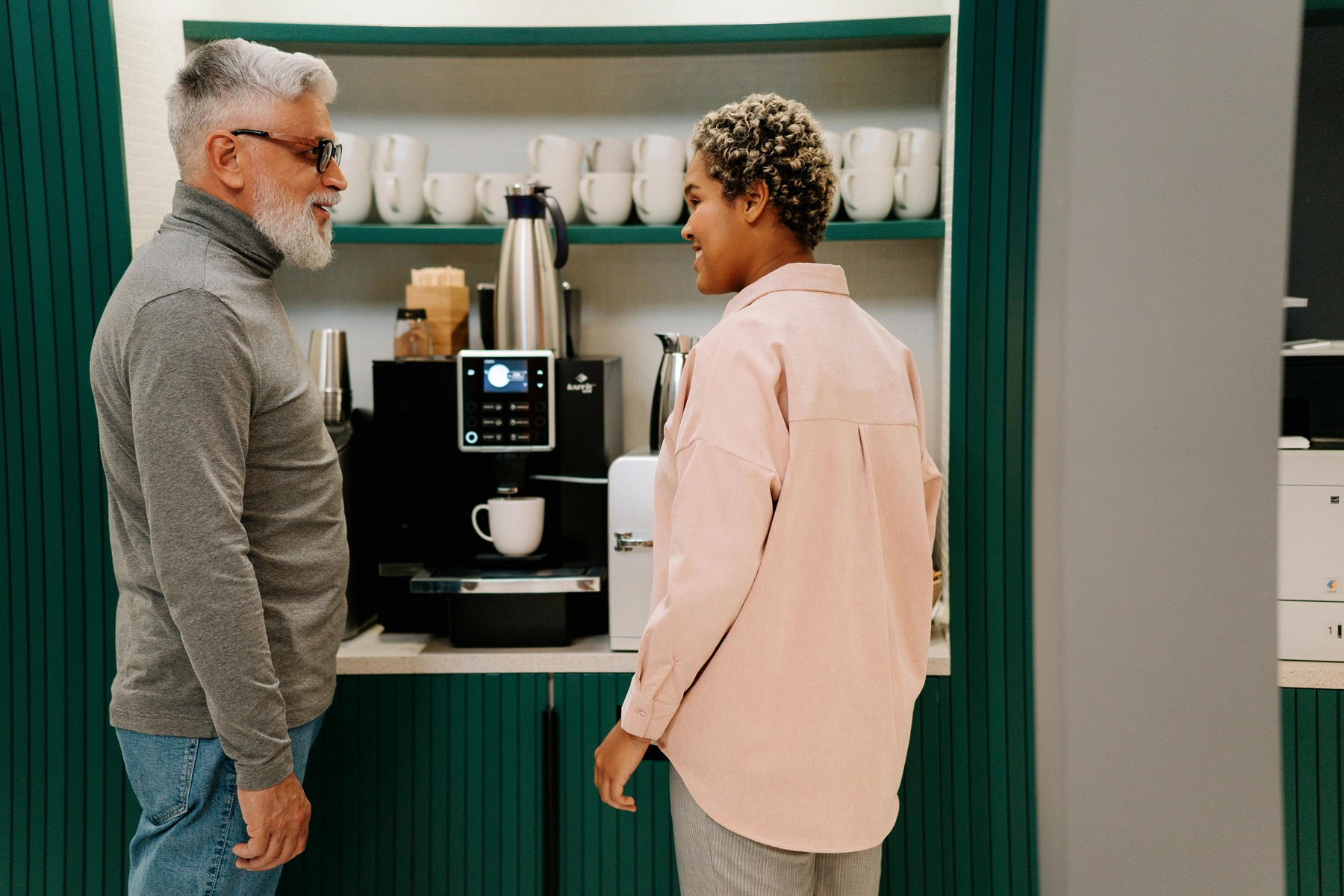Coffee consumption has become an integral component of the modern workplace, serving as a vital energizer for many professionals. It serves as a reliable pick-me-up, helping them recharge and maintain the energy levels needed to power through challenging periods, whether that’s overcoming morning grogginess, pushing through a post-lunch slump, or finishing strong at the end of the day.
Empirical research reveals that a substantial proportion of the workforce, approximately 65%, relies on coffee consumption during working hours, with an average daily intake of three cups per employee. Moreover, numerous professionals attest to the indispensable nature of coffee in facilitating their daily productivity. This widespread reliance on coffee highlights its considerable contribution to the UK’s economic landscape.
The pervasive influence of coffee in the workplace is a consistent trend across organizations of all sizes and sectors. For many employees, coffee has become an indispensable aspect of their daily work routine, contributing significantly to their overall job satisfaction. Research has shown that coffee consumption at work yields numerous benefits, including increased productivity, improved collaboration and socialization among colleagues, and a heightened sense of organizational culture and community
As the UK’s premier provider of commercial coffee machine solutions, we have established a reputation for delivering tailored solutions to offices of all sizes nationwide. This comprehensive guide distills our expertise into actionable insights, empowering coffee machine procurers and business owners to make informed decisions when selecting a commercial coffee machine that meets the unique needs of their office environment.
While quality is a paramount consideration in selecting a coffee machine, it is equally important to evaluate other critical factors that extend beyond the machine’s capacity to deliver high-quality beverages. A thorough assessment of your office’s coffee consumption patterns is essential to ensure that your chosen machine meets the unique demands of your workplace.

Insufficient coffee supplies, inadequate machine maintenance, and subpar beverage quality can significantly undermine workplace satisfaction. Running out of essential items, such as coffee beans, water, or cups, can cause frustration and disruption.
Moreover, serving lukewarm coffee due to prolonged waiting times can exacerbate the issue. Poorly maintained machines can also lead to suboptimal flavor profiles, further eroding morale. If left unaddressed, these seemingly minor issues can have a profound impact on employee satisfaction, ultimately affecting the overall company culture.
This blog provides expert guidance on quantifying coffee consumption within your organization, while also considering the nuanced and varied coffee preferences of your team members. By analyzing their beverage choices, consumption frequency, and peak usage times, we empower you to tailor our recommendations to your unique office dynamics and coffee culture. As a trusted partner, Sidd Capital Shop is committed to delivering premium coffee machines that foster a superior coffee experience for your employees, simplifying the procurement process for facilities managers and decision-makers.
What motivates office professionals to consume coffee?
The UK office coffee market has exhibited robust growth, characterized by a consistent 6% annual increase over the past three years, resulting in a substantial industry valued at £2.7 billion. Notably, the nation’s traditional preference for tea has been surpassed by coffee consumption, with the workplace emerging as the predominant setting for coffee consumption. This shift has driven a significant evolution in the office coffee landscape, marked by a growing demand for high-quality, specialty coffee offerings that align with the refined tastes and expectations of contemporary professionals.
Key Factors Driving Office Coffee Consumption:
- Routine Consumption as a Productivity Catalyst
For numerous professionals, coffee consumption becomes an ingrained daily habit, punctuating the morning, mid-morning, and mid-afternoon periods. This habitual behavior is closely tied to productivity, as many individuals rely on coffee to enhance alertness and focus during critical periods. Moreover, coffee serves as a preparatory ritual for tackling complex or time-consuming tasks. By incorporating coffee into their daily routine, professionals can establish a sense of structure and predictability, mitigating the unpredictability of a dynamic work environment.
- Productivity Enhancement
The correlation between office coffee consumption and enhanced productivity is a recurring theme. Many professionals perceive coffee as a catalyst for increased productivity, and this notion is supported by scientific evidence.
The caffeine content in coffee provides a temporary yet effective boost in focus, energy, and cognitive function, enabling individuals to complete tasks efficiently.
Numerous studies have investigated the positive impact of caffeine on cognitive function, specifically in areas such as memory, concentration, and information processing. These findings suggest that caffeine consumption can lead to improved alertness, performance, and ultimately, higher levels of productivity.

- Social Interaction and Collaboration

Informal conversations and social interactions are essential components of a positive and productive work environment. In many organizations, the office coffee station serves as a hub for casual discussions and connections among colleagues. By providing dedicated areas for hot and cold beverages, companies can foster a sense of community and facilitate personal interactions during designated coffee breaks.
In larger offices, where employees from different departments may have limited opportunities to interact, the coffee station can play a vital role in bridging these gaps. By encouraging informal conversations, organizations can promote stronger connections, enhance workplace morale, and cultivate a positive corporate culture.
From a communication perspective, the coffee station can also facilitate more natural and spontaneous discussions among team members. Colleagues can engage in collaborative brainstorming, pose questions, and discuss ongoing projects in a relaxed and informal setting, often leading to more innovative and effective solutions.
Assessing Office Coffee Consumption: What Metrics Matter?
To identify the ideal coffee machine for your office, it is essential to conduct a thorough analysis of your workplace’s unique requirements. This involves considering the diverse tastes, needs, and preferences of your employees.
When evaluating the perfect office coffee machine, key criteria include assessing your team’s coffee preferences, daily consumption patterns, and flexible work arrangements, as well as peak attendance days and busiest coffee-making periods. By gathering insights through the following options, you will be able to determine the optimal coffee machine that meets the demands and expectations of your workplace.

Conduct an Employee Coffee Preferences Survey
To ensure the selection of a coffee machine that caters to the diverse needs and preferences of your workforce, it is essential to conduct a thorough employee survey. This survey should gather data on the following key aspects:

- Beverage preferences: Identify the most popular coffee-based drinks, such as espresso, latte, or mocha, as well as tea options.
- Milk preferences: Determine the types of milk and flavorings preferred by employees.
- Machine requirements: Assess the need for features like milk feed/heat elements or basic coffee vending solutions.
- Additional services: Explore requirements for tea options, new employees, and visitors.
- Taste preferences and expectations: Analyze employee tastes, time expectations, and maturity levels to determine the suitability of bean-to-cup or sachet/pod systems.
- Consumables and accessories: Gather information on preferences for fresh roasted coffee beans, flavored syrups, drink stirrers, and decaffeinated options.
By conducting a comprehensive survey, you can ensure that your coffee machine selection meets the unique needs and preferences of your workforce, enhancing employee satisfaction and productivity.
Tracking Coffee Facility Utilization: A Data-Driven Insight
To gain insights into coffee consumption and usage in the office, two primary methods can be employed:
- Automated Tracking: Utilize software programs to track coffee machine usage, providing accurate data on daily consumption levels. Suitable for larger offices with high coffee machine usage.
- Observational and Manual Tracking: Implement consumption logs and template checklists for employees to fill out when using the facilities. Observe machine usage, peak times, and popular drinks. Ideal for smaller offices or to validate survey data.
When considering a coffee machine for a larger office space, factors to consider include:
- Location: Gather feedback on optimal placement.
- Machine quantity: Determine if multiple machines are needed to match office size and coffee demand.
To inform machine selection, surveys can help identify:
- Employee preferences: Quick necessity, frequent breaks, or positive taste experience.
- Machine type: Utilize multiple-choice options for commonalities and open-ended questions for context.
Analyzing Office Coffee Habits: Understanding Consumption Patterns
Researching the coffee drinking habits of office workers can provide valuable insights into their consumption routines. Key findings include:
- Over 67% of office workers drink coffee in the morning to maintain energy levels and stay focused.
- Most office workers follow a routine of drinking coffee in the morning, midday, and afternoon to avoid feeling unfocused.
When researching office coffee habits, consider exploring:
- Time of day: Identify peak coffee consumption times to determine coffee machine utilization.
- Correlation between productivity and consumption: Analyze if coffee consumption patterns impact employee productivity and focus.
Selecting the Optimal Coffee Machine: A Data-Driven Approach
With coffee playing a vital role in the daily work routine, choosing the right machine for your organization’s needs is crucial. While office size is an important consideration, coffee consumption patterns are the primary factor in selecting a machine that will perform optimally.
For instance, a team of 10 employees consuming an average of three cups per day will require a machine with higher capacity than an office of 30 employees who infrequently drink coffee.
The repercussions of selecting the wrong coffee solution can be far-reaching, impacting productivity, employee satisfaction, and even job retention. Research reveals that paid vending solutions can negatively affect employee morale, with 80% of respondents indicating that complimentary hot beverages enhance their job satisfaction.
To determine your office’s coffee consumption levels, consider the following guidelines:
- High consumption: 350-250 cups per day
- Medium consumption: 80-100 cups per day
- Low consumption: 30-50 cups per day
Higher consumption machines are typically better suited for larger office spaces with multiple users, while smaller commercial machines cater to lower consumption levels, ideal for smaller office spaces.
Optimizing Coffee Solutions for Medium to Large-Sized Offices
Selecting a coffee machine capable of handling 250-350 cups per day can be a complex decision, given the numerous options available. To simplify this process, we have curated a list of our top three recommendations, tailored to meet the needs of larger workforces (100+ employees) and organizations with high coffee demands, providing a range of choices to cater to diverse staff preferences.
